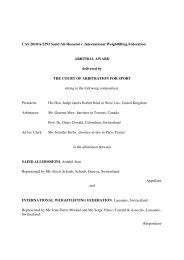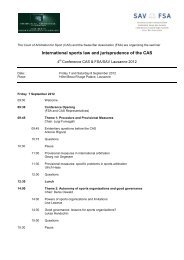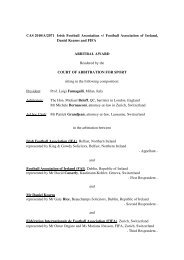(CAS) Bulletin - Tribunal Arbitral du Sport / TAS
(CAS) Bulletin - Tribunal Arbitral du Sport / TAS
(CAS) Bulletin - Tribunal Arbitral du Sport / TAS
Create successful ePaper yourself
Turn your PDF publications into a flip-book with our unique Google optimized e-Paper software.
- how the Prohibited Substance entered the<br />
Athlete’s system; and<br />
- that he bears no fault or negligence, or no<br />
signifi cant fault or negligence.<br />
Consequently, the burden of proof shifts to the<br />
Athlete and the standard of proof for the Athlete to<br />
establish his theory how the prohibited substance<br />
entered his body is, pursuant to Article 22 UCI ADR,<br />
on a “balance of probability”.<br />
The parties to these proceedings are in dispute as to<br />
how the term “burden of proof ” is to be understood and<br />
what obligations derive therefrom.<br />
The applicable regulations do not defi ne the term<br />
“burden of proof ”.<br />
Despite the notion of “burden of proof” being tied<br />
to the taking of evidence, the predominant scholarly<br />
opinion is that – in international cases – burden of<br />
proof is governed by the lex causae, i.e. by the law<br />
applicable to the merits of the dispute and not by the<br />
law applicable to the proce<strong>du</strong>re (POUDRET/BESSON,<br />
Comparative Law of InternationalArbitration, 2 nd<br />
ed, 2007, no 643; KAUFMANN-KOHLER/RIGOZZI,<br />
Arbitrage International, 2 nd ed., 2010, no 653a;<br />
BERGER/KELLERHALS, International and Domestic<br />
Arbitration in Switzerland, 2 nd ed, 2010, no 1203).<br />
Therefore, the fi rst question to be determined is<br />
which is the applicable law to the merits, other than<br />
the UCI Regulations, to which the Panel can turn for<br />
any necessary clarifi cations concerning the content of<br />
the “ burden of proof ”.<br />
While Art. 345 UCI ADR points – at least subsidiarily<br />
– to Swiss Law, Art. 369 of the UCI ADR provides<br />
that “[T]hese Anti-Doping Rules shall be interpreted as<br />
an independent and autonomous text and not by reference to<br />
existing law or statutes”. Despite the contradiction in<br />
the regulations the Panel will seek guidance from<br />
Swiss law to the extent that this is compatible with<br />
international standards of law.<br />
Under Swiss law, the “burden of proof” is regulated<br />
by Art. 8 of the Swiss Civil Code (“CC”), which,<br />
by stipulating which party carries such burden,<br />
determines the consequences of the lack of evidence,<br />
i.e. the consequences of a relevant fact remaining<br />
unproven (non liquet, cf BSK-ZGB/SCHMID/LARDELLI,<br />
4 th ed., 2010, Art 8 no 4; KuKO-ZGB/MARRO, 2012,<br />
Art. 8 no 1).<br />
Indeed, Art. 8 CC stipulates that, unless the law<br />
provides otherwise, each party must prove the<br />
facts upon which it is relying to invoke a right,<br />
thereby implying that the case must be decided<br />
against the party that fails to ad<strong>du</strong>ce such evidence.<br />
Furthermore, the burden of proof not only allocates<br />
the risk among the parties of a given fact not being<br />
ascertained but also allocates the <strong>du</strong>ty to submit the<br />
relevant facts before the court/tribunal. It is the<br />
obligation of the party that bears the burden of proof<br />
in relation to certain facts to also submit them to the<br />
court/tribunal (ATF 97 II 216, 218 E. 1; BSK-ZGB/<br />
SCHMID/LARDELLI, 4 th ed 2010, Art 8 no 31; DIKE-<br />
ZPO/Glasl, 2011, Art 55 no 15).<br />
The question of who bears the risk of a certain fact<br />
not being ascertained only comes into consideration<br />
if the fact submitted by the party bearing the burden<br />
of proof is contested by the other party.<br />
Therefore, a crucial question is what efforts a party<br />
must make in order to validly contest the allegations<br />
made by the other party.<br />
According to Swiss Law a valid contestation of facts<br />
needs to be specifi c, i.e. it must be directed and<br />
attributable to an indivi<strong>du</strong>al fact submitted by the<br />
party bearing the burden of proof (DIKE-ZPO/<br />
LEU, 2011, Art 150 no 59). Whether in addition to<br />
that, the contesting party needs to substantiate its<br />
submission, in particular whether the contesting<br />
party is under an obligation to give an explanation<br />
of why it thinks that the facts it contests are wrong,<br />
is not clearly regulated. The new CPC appears to<br />
point in that direction (DIKE-ZPO/LEU, 2011, Art<br />
150 no 59). However, the threshold for meeting such<br />
an obligation to specify the contestation is – under<br />
normal circumstances - rather low, since it must<br />
be avoided that the prerequisites for contesting an<br />
allegation result in a reversal of the burden of proof<br />
(BSK-ZPO/GUYAN, 2010, Art 150 no 4; BSK-ZGB/<br />
SCHMID/LARDELLI, 4 th ed, 2010, Art 8 no 30).<br />
Nevertheless, there are exceptions to this low<br />
threshold.<br />
The exceptions concern cases in which a party is<br />
faced with a serious diffi culty in discharging its<br />
burden of proof (“ état de nécessité en matière de preuve ”,<br />
“Beweisnotstand ”). A cause for the latter may be that<br />
the relevant information is in the hands or under the<br />
control of the contesting party and is not accessible<br />
to the party bearing the burden of proof (cf ATF 117<br />
Ib 197, 208 et seq). Another reason may be that, by<br />
it very nature, the alleged fact cannot be proven by<br />
direct means. This is the case whenever a party needs<br />
to prove “negative facts ”.<br />
Jurisprudence majeure / Leading cases<br />
-<br />
116





